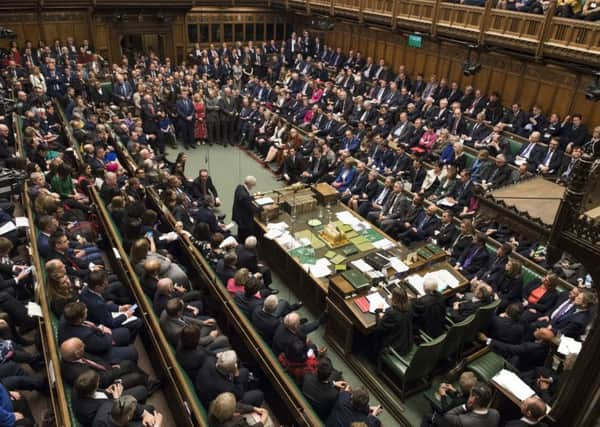Tony Rossiter: The worst government, the worst prime minister, the worst opposition leader, is there nay help for Britain?


For more than 40 years, I was a professional, politically impartial civil servant – a middle-ranking official, trying to help the government of the day implement its policies.
Advertisement
Hide AdAdvertisement
Hide AdI began with Harold Macmillan as prime minister and ended with Tony Blair.
In between, there was Alec Douglas-Home, Harold Wilson, Edward Heath, Harold Wilson (again), James Callaghan, Margaret Thatcher and John Major.
I never worked for a government as incompetent as the one we now have.
Advertisement
Hide AdAdvertisement
Hide AdEvery one of those prime ministers stands head and shoulders above Theresa May.
And every leader of the opposition has been better than Jeremy Corbyn.
Just imagine, for example, how John Smith (1992-94) would have dealt with Mrs May and her Brexit shenanigans.
All governments do good things and not-so-good things; and all prime ministers have dark days.
Advertisement
Hide AdAdvertisement
Hide AdThink back: Harold Wilson’s devaluation in 1967; Ted Heath’s three-day week; the 1970s’ Labour government going ‘‘cap in hand’’ for a bailout from the IMF; Margaret Thatcher’s poll tax; John Major’s Black Wednesday; Tony Blair’s Iraq war.
In all those cases, we had a more or less competent government and a prime minister who was acting in what he or she believed to be the country’s best interests.
The comparison with David Cameron and Theresa May is stark. Here are two prime ministers who have acted not in the interests of the country, but in the interests of the Conservative Party.
David Cameron promised his EU referendum in order to buy off Ukip votes at the 2015 election and to placate ideological, anti-EU zealots like Sir John Redwood and Sir Bill Cash.
Advertisement
Hide AdAdvertisement
Hide AdHe is reported to have told Donald Tusk that he did not expect to have to keep this promise, because he did not expect to win the 2015 election; and he believed that if he was in coalition again with the Lib Dems, they would veto the idea.
The referendum that has divided our country was a cynical, vote-harvesting ploy.
Mrs May’s actions since becoming prime minister have all been about trying to keep the Conservative Party together.
She has allowed Brexit to squeeze out – and take civil service resources away from – a host of other issues, such as social care, that need urgent action.
Advertisement
Hide AdAdvertisement
Hide AdHer judgment has been terrible. Her first Brexit Secretary was David Davis, a politician not known for his command of policy detail.
Mrs May appointed Boris Johnson as Foreign Secretary. That is one of the great offices of state. Most incumbents have been politicians of real stature: during my time they included Alec Douglas-Home, Anthony Crosland, Peter Carrington, Sir Geoffrey Howe, Douglas Hurd and Robin Cook.
Boris Johnson, with his cavalier approach to the truth, is not in the same league. And if his reported f-word comment is accurate, he does not care about business.
Putting off difficult decisions about Brexit for two-and- a-half years, in order to keep the Conservative Party together, has made life almost impossible for business that needs, above all, stability and certainty.
Advertisement
Hide AdAdvertisement
Hide AdIf Mrs May’s Cabinet appointments showed poor judgment and a determination to put party before country, those traits were evident in spades in her decision to call the 2017 election which backfired so spectacularly.
Mrs May, a vicar’s daughter, does not tell the truth. “There will be no election,” she had said. Then she called one. “There is no magic money tree,” she told a nurse who had not had a pay increase for eight years.
Then she rustled up a whopping £1bn for her deal with the DUP – and twice that amount to plan for a ‘‘no-deal’’ which most people believe would be a disaster.
On the morning of December 10, Downing Street (and Michael Gove on the Today programme) categorically confirmed that the following day’s meaningful vote would go ahead.
Advertisement
Hide AdAdvertisement
Hide AdThat afternoon, it was pulled. “We will leave the EU on March 29,” she has said. Well, we shall see. I wouldn’t put money on it.
Our European friends must be looking on in bewilderment and incredulity at the goings-on in the House of Commons. At this critical point in our history, the Prime Minister and Opposition leader trade insults and score political points.
Has our political system ever been so dysfunctional?
With the Palace of Westminster due for repair and renovation, perhaps we should bring in the bulldozers and demolition gangs.
That confrontational, adversarial set-up can make good theatre, but does it make for good government? Is it time to rip out those green benches and put in the more civilised seating arrangements we see in most other parliaments?
Advertisement
Hide AdAdvertisement
Hide AdMPs who know in their heart of hearts that Brexit will make our country poorer at home and less influential abroad now need to act bravely.
They will betray their constituents if, out of a misguided belief that they must honour the results of a flawed referendum, they support a deal which is worse than the one we already have as a member of the EU.
Remember: MPs are representatives, not delegates. They should be honest with their constituents and true to their convictions.
Tony Rossiter, from North Yorkshire, is a former diplomat and civil servant who worked predominantly at the Department of Trade and Industry.